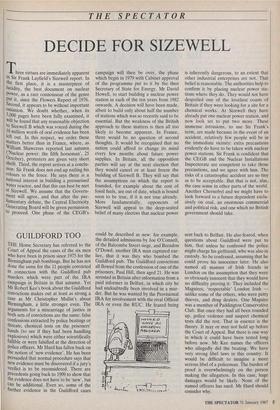GUILDFORD TOO
THE Home Secretary has referred to the Court of Appeal the cases of the six men who have been in prison since 1975 for the Birmingham pub bombings. But he has not done the same for the 11 people convicted in connection with the Guildford pub murders which were part of the IRA campaign in Britain in that autumn. Yet Mr Robert Kee's book about the Guildford convictions makes out at least as strong a case as Mr Christopher Mullin's about Birmingham, a little stronger even. The arguments for a miscarriage of justice in both sets of convictions are the same: false confessions extracted by police beatings or threats; chemical tests on the prisoners' hands (to see if they had been handling explosives) which were either scientifically fallible or were falsified at the direction of Police officers. Mr Hurd has fallen back on the notion of 'new evidence'. He has been persuaded that normal procedure says that new evidence must be discovered if a jury's verdict is to be reconsidered. There are precedents going back to 1909 to show that the evidence does not have to be 'new', but can be additional. Even so, some of the further evidence in the Guildford cases could be described as new: for example, the detailed admissions by Joe O'Connell, of the Balcombe Street siege, and Brendon O'Dowd, another IRA man captured ear- lier, that it was they who bombed the Guildford pub. The Guildford convictions all flowed from the confession of one of the prisoners, Paul Hill, then aged 21. He was arrested in Britain after information from a paid informer in Belfast, in which city he had undoubtedly been involved in a mur- der. But he was wanted by the Provisional IRA for involvement with the rival Official IRA or even the RUC. He feared being sent back to Belfast. He also feared, when questions about Guildford were put to him, that unless he confessed the police might charge his girlfriend, who was also in custody. So he confessed, assuming that he could prove his innocence later. He also named all manner of Irish friends in London on the assumption that they were so obviously innocent that they would have no difficulty proving it. They included the Maguires, 'respectable' London Irish unlike some of the others, who were petty thieves, and drug dealers. One Maguire was a member of Paddington Conservative Club. But once they had all been rounded up, police violence and suspect chemical tests did the rest. That in essence is the theory. It may or may not hold up before the Court of Appeal. But there is one way in which it could have been tested long before now. Mr Kee names the officers who allegedly did the beating. We have very strong libel laws in this country. It would be difficult to imagine a more serious libel of a policeman. The burden of proof is overwhelmingly on the person making the allegation. In this case, huge damages would be likely. None of the named officers has sued. Mr Hurd should consider why.



































 Previous page
Previous page